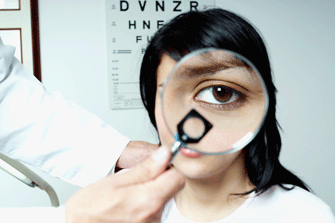If you spend hours each day working at a computer screen, you may experience eyestrain, blurred vision, itchy eyes, and occasional double vision.
"But studies have found no indication that working on a computer screen causes permanent vision problems," says Kent Daum, O.D., an optometrist at the University of Alabama School of Optometry in Birmingham. "Short-term problems, such as tired, irritated, or watery eyes, do bother 70 percent to 75 percent of people who work at computers, but these problems can usually be corrected by wearing a special pair of glasses for computer work, adjusting lighting in the workplace, and altering the position of the computer screen."
Correct vision problems
One of the easiest ways to prevent eye fatigue and discomfort is to see a vision specialist.
"Minor visual problems, such as astigmatism or imbalances between the eyes, can be corrected by wearing corrective lenses, and you'll greatly increase your comfort," Dr. Daum says. "If you don't have to see distant objects clearly while at the computer, wearing bifocal lenses with the top adjusted for the computer screen and the bottom adjusted for reading is best."
If your distance vision must be clear while working at the computer, bifocal lenses with the upper part adjusted for distance and a large bottom part adjusted for the computer is recommended. As an alternative, a progressive lens with a large middle section for computer work could be used.
"Some people can comfortably use bifocal contact lenses when working at a computer, but in most cases, glasses will provide greater comfort and clearer vision," Dr. Daum says.
Increase your comfort
The following steps can further reduce your eye discomfort and fatigue.
- Place the computer straight in front of you, not off to the side.
- Place the screen at right angles to any windows to minimize glare.
- Adjust the screen angle to minimize reflections from overhead lights or desk lamps.
- Use drapes, shades or blinds to control window lighting and glare. Vertical or horizontal blinds will direct light away from you and the computer.
- Keep the screen brightness the same or brighter than the brightness of other objects in the room.
- Set your computer to display black characters on a white background.
- Use an adjustable copy holder to keep reference material at the same height and distance away from you as the computer screen. "This eliminates the need to change eye focus when looking from one to the other," Dr. Daum says.
- Use a glare-reduction filter to enhance screen contrast and increase character legibility. Use a three-sided computer hood if glare continues to be a problem.
- Wipe the screen often with an anti-static cloth.
- Take periodic rest breaks. "Every 15 minutes or so, look up and focus on a distant object for about two minutes," Dr. Daum says. "Blinking frequently and using artificial-tear eye drops to relieve dryness and irritation can also help."
|
Wellness Library Health Ink and Vitality Communications ©2014 |